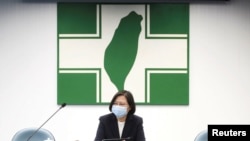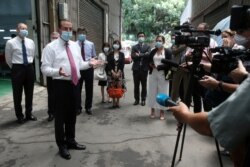China's crackdown on democratic freedoms in Hong Kong has generated strong reactions in Taiwan, where senior officials are mourning Hong Kong's losses even as they revel in a rare surge of diplomatic attention themselves.
"We are saddened and alarmed to see this beacon of civil liberties become extinguished, in violation of the promises Beijing had made to the people of Hong Kong, as well as the international community," Taiwan President Tsai Ing-wen told a Washington audience via teleconference this week.
Tsai returned to the theme at a separate gathering of her Democratic Progressive Party (DPP) in Taipei, where concerns for Hong Kong dampened her obvious enthusiasm over back-to-back visits to Taiwan by a delegation from Japan led by former Prime Minister Yoshiro Mori and one led by U.S. Health and Human Services Secretary Alex Azar, the most senior U.S. official to visit the island in more than 40 years.
"Our citizens have all been excited over the visits by the American and Japanese delegations [but] it's clear that the situation in Hong Kong is deteriorating," Tsai said.
The president remarked on televised scenes of Hong Kong citizens lining up at newspaper stalls in the middle of the night to purchase copies of Apple Daily, in a show of support for the paper and its publisher Jimmy Lai, who had just been arrested along with several colleagues and family members.
"The paper is nearly sold out everywhere; some people even said that 'even if [Apple Daily] only consisted a piece of white paper, I still want to buy it,'" she told the DPP officials. "I am extremely touched."
Tsai is months into her second four-year term, which she won with a decisive election victory in January widely seen as an endorsement of her position that any potential economic benefits alone did not justify seeking closer ties with Beijing.
"People say that the second term is supposed to be easier than the first, they must be people that have not experienced the year 2020 like we have," Tsai said during Wednesday's video conference, organized by the Hudson Institute and the Center for American Progress.
She said Taiwan is "not immune" to the current pandemic's aftershocks and has instituted stimulus measures like most other countries, even though the island has been one of the most successful in keeping the pandemic at bay.
Taiwan's vulnerability to Chinese aggression, felt more acutely as Beijing tightens its grip on Hong Kong, has forced Tsai's government to beef up defense spending and strengthen alliances with the United States, its most significant partner, and other "like-minded democracies," as Tsai put it.
The threat was driven home this week by Chinese media reports that China's military had conducted live-fire drills and flown jet fighters across the "middle line" of the Taiwan Strait in response to the Azar visit.
Tsai's government this week proposed a roughly 10% increase in its defense budget from the current level, which is already 2.3% of GDP. Approval is expected, given her party's solid legislative majority.
But Tsai played down the fear of any imminent attack and said her approach to relations with Beijing will be governed by four principles she first announced in May during her second inaugural speech — peace, parity, democracy and dialogue.
Taiwan "will neither act rashly to escalate confrontation, nor will we give in," officials at the de facto embassy in Washington told VOA afterwards.
Tsai said Taiwan "will always acknowledge the historical and cultural ties that exist across the Strait. And we will never stop believing that there can be a better future ahead."
She stressed the right Taiwan's 23 million people have to determine their own future, a stand she called the "antithesis" of Beijing's position.







